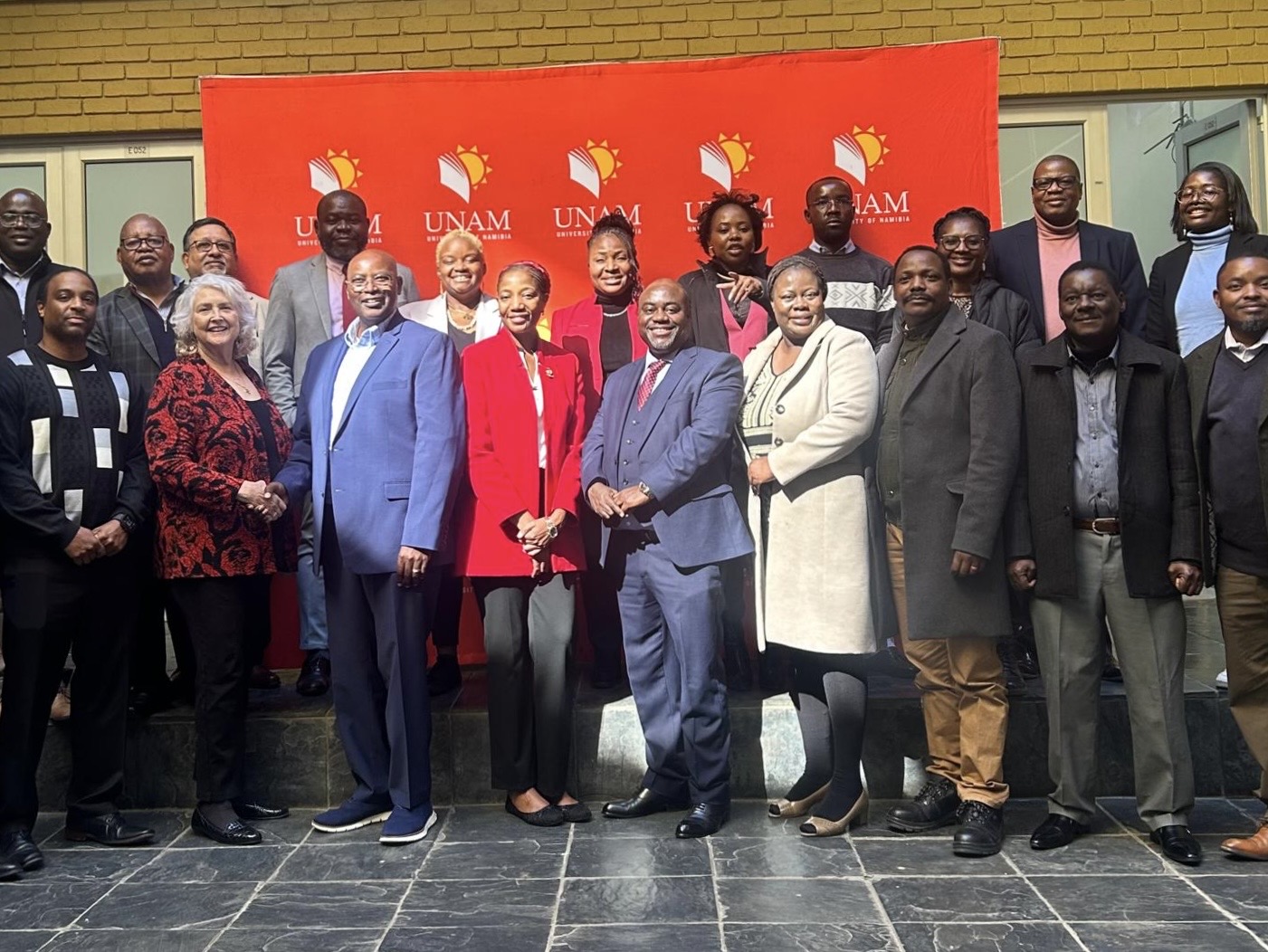Newsroom
Grant project sparks international innovation in Sub-Saharan Africa
Posted on Oct 27, 2025
Cedric Ogden, PhD, (far left) visited Namibia to share his expertise in precision agriculture.
Cedric Ogden, PhD, Fort Valley State University’s (FVSU) Extension engineer and state coordinator for the Southern- Sustainable Agriculture Research and Education (SARE) program, traveled to Sub-Saharan Africa as a part of a research team to share his expertise in renewable energy systems, digital tools and remote sensing. Through Ogden’s expertise in precision agriculture, FVSU has one of the largest solar farms located on a college campus at approximately 11 megawatts. In this Q&A, learn how his efforts are helping FVSU Extension connect with partners across the globe in innovation and technology.
Where did you travel to and why this location?
“I traveled to Windhoek, Namibia, July 4-13, to conduct a working group session and share information under a capacity building grant called IDEAS. Rayton Sianjina, PhD, served as the principal investigator of this grant project titled, “Establishing a Consortium and Cultivating Leaders Between FVSU and Selected Sub-Saharan Institutions.” These Sub-Saharan countries were chosen because of the partnership between the University of Zambia, Midland State University and the host institution, the University of Namibia.”
What was the purpose of this trip?
“The purpose of this trip was to increase our capacity to administer study abroad programs. We aim to expand our research agenda, foster international partnerships and drive progress in agricultural research and food systems. Our faculty working group focused on the areas of climate, energy and the environment, innovation and technology and global health.”
Who traveled with you?
“Fort Valley State University traveled with a delegation of five. This included Rayton Sianjina PhD, director of FVSU’s Global Studies Program. Andrea Romero, program specialist for FVSU’s Global Studies and Engagement Program, Nirmal Joshee, PhD, FVSU associate professor of plant science/ biotechnology and Hamidah Sharif-Amanyi, EdD, FVSU associate professor of public health. Researchers and faculty from Midland State University, the University of Zambia and the University of Namibia were also in attendance.”

Cedric Ogden, PhD, (bottom far left) with faculty, researchers and staff from Fort Valley State University, Midland State University, the University of Zambia and the University of Namibia.
Describe the location, people and the culture.
“When we traveled it was their winter in early July. The temperature ranged between 40 degrees and the low 70’s. We visited several markets in the Single Quarter community. There were a variety of diverse delicacies that ranged from barbecued wild game (kapana) to roasted mopane worms. We ate with the people and shared our upbringings and daily life. We saw several tribes and visited a reserve where we shared breakfast in the presence of white rhinos.”
What role did you play in this initiative?
“I chaired a week-long working group session in innovation and technology. The theme of this working group session was titled, “Innovative technology - Providing a pivotal role in advancing sustainability across sectors.” I focused on renewable energy, remote sensing technology, sustainable agriculture and artificial intelligence (AI) & machine learning.”
What are some of the results/impacts of this trip?
“We are continuing to share knowledge and guidance in research and educational curriculums. We maintain communication and one day plan to host students and faculty here in Fort Valley. Also, we are looking into the artificial intelligence (AI) platform that the University of Zambia is using in their labs to collect information on the growing rates of forest stands. As a plant grows, they can monitor its growth rate and make recommendations based on environmental conditions. It’s in development.”
What was your most memorable experience and what role is Extension having in international agriculture?
“My most memorable experience is the comraderies that we had with faculty from the universities. We were able to share our challenges and successes in our respective careers and research areas. Regarding Extension’s international outreach, this is the mission of Extension. Our purpose is to provide outreach and impact those who need it.”
What are some next steps?
“We are still working on student engagement and student exchange with the study abroad program. We want to increase our student exposure so they can understand global challenges and work together for solutions.”
What did this experience teach you?
“This experience has taught me the importance of not working in silos. This project allows us to work interdisciplinary. It taught me that we are all connected and should work outside our labs and across disciplines more often to address global concerns.”
- Categories:
- FVSU Agriculture College
- Outreach